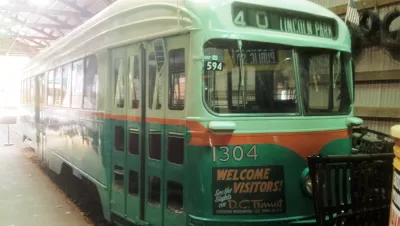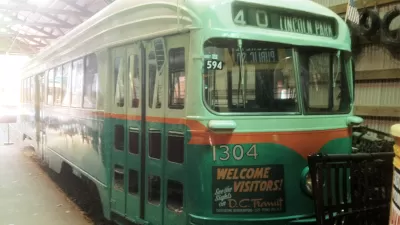In January, Washington D.C. Mayor Vincent C. Gray claimed that the district's new streetcar would open in February. Still not open, the D.C. City Council this week slashed future streetcar spending.

An article by Emily Washington shares news of the vote by the Washington D.C. City Council to cut future streetcar spending as part of a tax reform package, but the majority of the post is dedicated to explaining the limitations of the forthcoming Streetcar, which will run along the district's H Street corridor.
First, Washington paraphrases earlier coverage of streetcars after noticing that many D.C. Streetcar advocates have been touting the project's economic benefits, rather than it's transportation benefits: "the benefits of streetcar over bus depend heavily on streetcars having dedicated lanes, which most of DC’s streetcars wouldn’t have."
Then there is the impact of the streetcar infrastructure on other modes: "In Toronto, streetcar tracks are a factor in nearly one-third of serious bicycle accidents."
Washington also raises the question of where the line's potential ridership: "this streetcar will only provide effective transportation for people visiting H Street retail destinations from the adjacent residential neighborhoods. It does not connect residential neighborhoods to job centers."
And then again, the impacts of the streetcar on other modes: "The H Street corridor has the one of the city’s busiest bus routes with an average of over 15,000 riders each weekday. Unlike the streetcar, the X1, X2, and X9 buses actually connect residential neighborhood’s to job centers and they serve passengers who live farther east in Anacostia. The streetcar will reduce the effectiveness of these valuable routes by adding to delays and reducing frequency as a result."
For more on the tax package approved by the City Council, see an earlier post by David Alpert, which explains the differences between the city council's package and the mayor's: "the change will devote about $400 million for the streetcar over five years. The mayor's proposal dedicates about $800 million over five years, rising to $3 billion over ten years."
FULL STORY: DC streetcar: Worse than nothing

Maui's Vacation Rental Debate Turns Ugly
Verbal attacks, misinformation campaigns and fistfights plague a high-stakes debate to convert thousands of vacation rentals into long-term housing.

Planetizen Federal Action Tracker
A weekly monitor of how Trump’s orders and actions are impacting planners and planning in America.

San Francisco Suspends Traffic Calming Amidst Record Deaths
Citing “a challenging fiscal landscape,” the city will cease the program on the heels of 42 traffic deaths, including 24 pedestrians.

Defunct Pittsburgh Power Plant to Become Residential Tower
A decommissioned steam heat plant will be redeveloped into almost 100 affordable housing units.

Trump Prompts Restructuring of Transportation Research Board in “Unprecedented Overreach”
The TRB has eliminated more than half of its committees including those focused on climate, equity, and cities.

Amtrak Rolls Out New Orleans to Alabama “Mardi Gras” Train
The new service will operate morning and evening departures between Mobile and New Orleans.
Urban Design for Planners 1: Software Tools
This six-course series explores essential urban design concepts using open source software and equips planners with the tools they need to participate fully in the urban design process.
Planning for Universal Design
Learn the tools for implementing Universal Design in planning regulations.
Heyer Gruel & Associates PA
JM Goldson LLC
Custer County Colorado
City of Camden Redevelopment Agency
City of Astoria
Transportation Research & Education Center (TREC) at Portland State University
Jefferson Parish Government
Camden Redevelopment Agency
City of Claremont




























